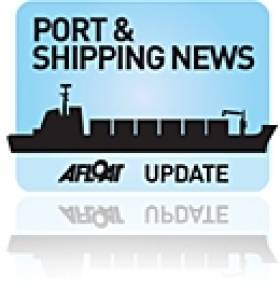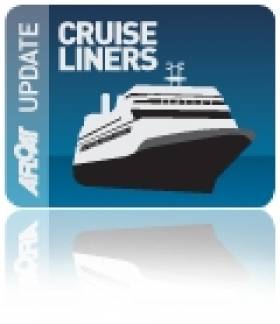Displaying items by tag: Emerald Isle Classic
Ports & Shipping Review: New Tallships Race and Cruise Operators, Superpower Naval Visitors, School at Sea, Irish Sea Excursions and Wind-Farms
#PORTS & SHIPPING REVIEW - Over the last fortnight Jehan Ashmore has reported from the Shipping scene where after the Irish Navy's role in the Tallships 'Parade of Sail', the inaugural Irish Sea Tall Ships Race finally got underway to Liverpool.
Also making a call to Dublin Port was cruise newcomer Plantour & Partners's whose small cruiseship Hamburg made her debut visit to the capital port.
The following day saw the classic cruiseship veteran Princess Daphne call, she was launched originally as a general cargo-ship serving the UK-Australia and New Zealand trade routes. In the same week her sister Princess Danae was arrested in Dublin Port, for an alleged non-payment of fuel bills. The dispute was eventually settled which saw the H&W built vessel depart for La Rochelle.
Operating profits at Irish Ferries of €3.2m for the first six months of 2012, remained the same compared to the same period last year, according to its parent company ICG which released its financial interim report.
A special call by the USS Fort McHenry (LSD-43), a dock landing ship to Dublin Port was made to coincide with American Football Week which allowed her crew to attend the Emerald Isle Classic showdown between the Navy and Notre Dame. On a related note US students where making their 'Semester at Sea' cruise on board Explorer which had called to Galway Bay and later the capital.
With the US Navy in Dublin, the rebel county had its own rare visit of the Russian Navy, when the destroyer Vice-Admiral Kulakov (626) called to Cobh. On both occasions the public were able to board.
Glasgow based Waverley Excursions have been running several unusual route excursions out of Northern Ireland. The final excursion was scheduled for today with a day-trip between Portaferry, Co. Down and Peel on the west coast of the Isle of Man.
While on waters off the east coast of the Irish Sea's largest island, proposals for an extended wind-farm will not require re-routing of shipping lanes according to developer Dong Energy. They operate the Walney Island wind-farm off Cumbria.
West Meets East: As Semester at Sea Ship Heads for The Gathering
#SEMESTER SHIP – Having made a recent visit to Galway, the cruiseship Explorer with more than 800 students, academics and crew are on board, as previously reported on Afloat.ie, is currently heading to the opposite side of the island, with a visit to Dublin Port, writes Jehan Ashmore.
The 25,000 tonnes vessel with its floating campus is due to dock in the capital tomorrow morning at Ocean Pier. The 180m vessel, formerly the Olympic Explorer built in 2000 for Royal Olympic Cruises is currently providing a "semester at sea" (SAS) programme through a world tour.
The SAS is operated on a not-for-profit initiative for the Institute for Shipboard Education, in co-operation with the University of Virginia in the US. Students taking the educational programme had set off on the world voyage from Halifax, Nova Scotia, with the first leg to Galway.
When Explorer berths in Dublin Port, she will join the United States Navy landing ship USS Fort McHenry (LSD-43) which as previously reported on Afloat.ie had already arrived last Thursday for the American Football Week.
It was downriver from her Ocean Pier berth at the nearby O2 Arena, where last night's televised "The Gathering: Notre Dame- A Welcome Home" , a special concert which was held for fans in the Docklands venue.
Today the Emerald Isle Classic with 33,000 fans of the games two big boys, Notre Dame and the Navy, is been held this afternoon, on the far side of the Liffey at the Aviva Stadium.
After her two-day call to Dublin the Explorer continues on its global tour with calls to the UK, Belgium, Portugal, Spain, Morocco, Ghana, South Africa, Argentina, Uruguay, Brazil and Dominica.

























































